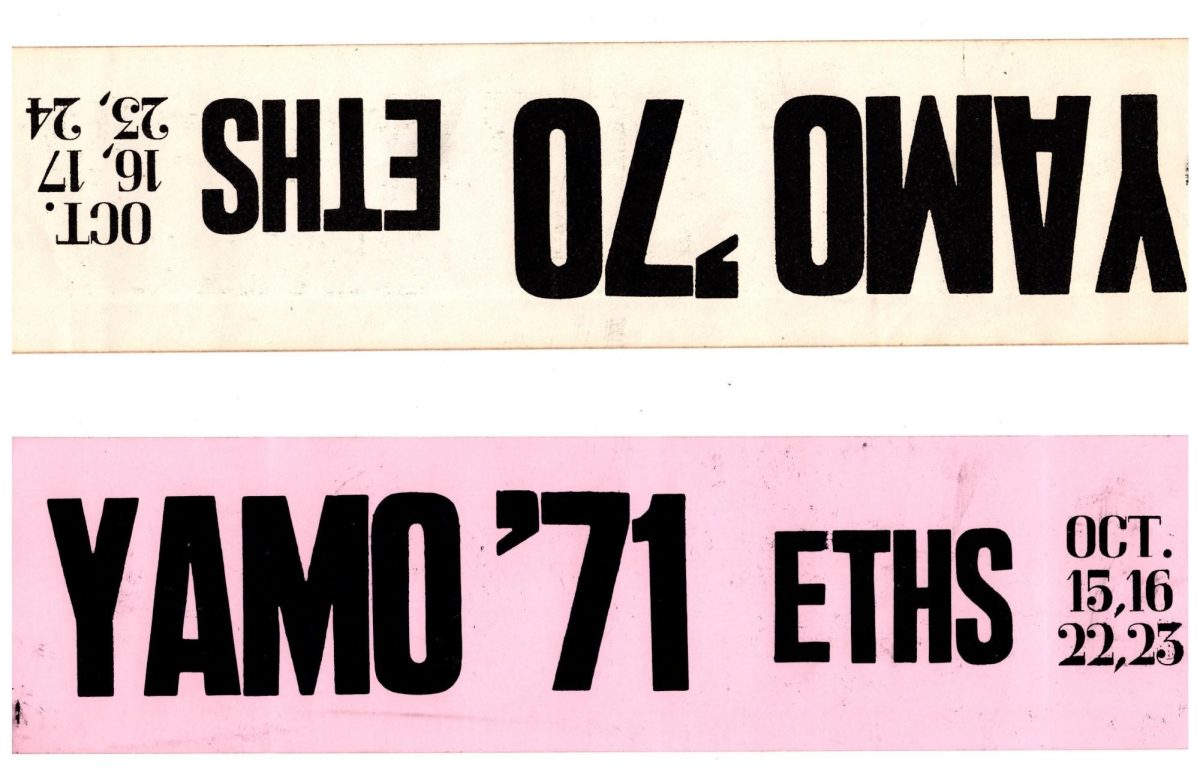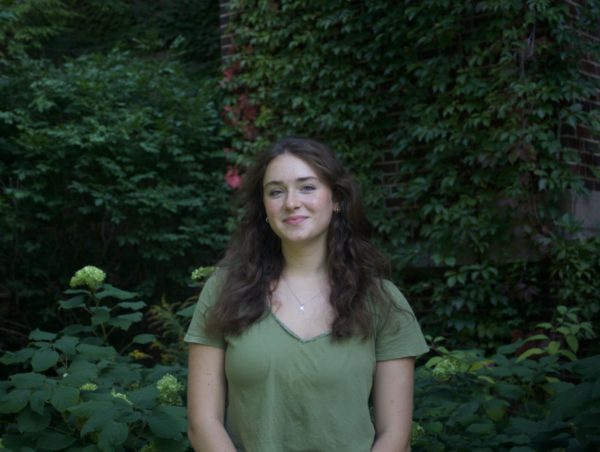The 66th edition of ETHS’ beloved production YAMO is rapidly approaching the stage, with six weeks of full-on preparation underway in order to bring the show to life.
YAMO is created by a board of directors and writers that compile as many ideas as they can, and work from there to create what we all see every year with the quick singing, dancing and acting scenes that pop on and off the stage. This year’s general directors are two seniors, Foster Pratt and Xyla Featherson, who both work closely with the rest of the board as well as Timothy Herbert and Aaron Carney—theater staff at ETHS—to make sure the show runs smoothly. Pratt and Featherson have both been in YAMO all four years, so they know what the experience is like at all different stages of high school.
Pratt and Featherson were selected along with the rest of the board during last school year, and had to deal with a quick turnaround.
“We started the brainstorming process and started working on the show much earlier,” senior writer Louis Hodges tells. “Back last year, [the board] didn’t start writing or even start brainstorming until the summer. [This year], we started finalizing in the summer.”
When brainstorming scenes over the summer, the writers and directors would come together almost every day and go back and forth pitching ideas that might possibly end up in the final script.
“We started every meeting with one scene we had written in the time between the last meeting, which was the day before, and we would share the scene we wrote,” Pratt explains. “Then we’d write for about two hours, and come back and share another scene we just wrote or edited. I expected it to be much more like ‘get YAMO done’ but it ended up being like this total community just laughing and pitching things.
This year, along with the directors, the wri ing team consisted of four seniors, Louis Hodges, Frank Herman, Jonas Foran and Vincent Perez. The job of writing the show is like no other. It takes a serious level of creativity and communication to bring ideas from their brains to the stage.
It’s also required for the writers to have previously been actors in the show so that they know exactly how the actors feel when rehearsing.
“It’s a show I know so well. It’s one I have developed and worked through. I come in, and I know what I want to do” Hodges explains. “My only focus is the show right now, instead of panicking about performing,” which has been the case for the past two years he has been involved.
With the amount of time the board gave itself to write, it honed their very best ideas over the summer, and knew exactly how to start the rehearsals when the anticipated time arrived. “We wanted to get the show into a position where on the first day [of rehearsals] we were ready to go,” Pratt elaborates.
Auditions were held last May, following the selection of the board. Auditions were where the talent that will actually be in the show were analyzed and selected, and all students were encouraged to try out. That’s the special thing about YAMO, explains Sydney Chow, the director of the YAMO company Impulse.
“Anybody can do it—you don’t have to be a mega-theater kid, you don’t have to be super able to sing. You can just do it if you’re funny in everyday life,” says Chow.

With all this encouragement and advertisement, over 100 students—ranging from incoming freshmen to seniors—came out to audition.
For the directors, auditions were a difficult process.
“The audition process was the weirdest and my least favorite part of the whole process so far, because we had an awesome turnout. We had around 110 people audition, which was fantastic,” Pratt tells. “But the problem is, we can only let in 36. Everyone deserves to be in YAMO for showing up to the audition and saying ‘I’m willing to get on the stage and make jokes.’ Having to limit it to 36 was incredibly frustrating and heartbreaking.”
After selecting 36 students, YAMO was split up into four different companies: Impulse, Unexpected, Acting and Dance—and also a crew and orchestra that are instrumental to the show. They all take on a certain role within YAMO, which is what makes the collage of talent so unique compared to all the other shows put on at the school. YAMO can be closely compared to a production like Saturday Night Live in this sense—you never know what a performance will entail, and the actors take on completely different projects for each scene.
The beginnings of any rehearsals have nerves on the rise, with a fresh new group of faces and roles being assigned. Eventually, the pressure is something the performers will all have to overcome.
“I’m really excited to just see everybody come into their characters and get more comfortable because people are a little bit nervous right now,” Chow explains.
Along with acclimating to their new roles, the students involved have to get to know each other.
The cast of YAMO works as hard as they can for the six weeks of prep before show time, and there are some annual activities sprinkled throughout to help the cast form a stronger bond.
When asking board members their favorite activities, “YAMO-lympics” and “PRAMO” were the two that made it into every answer.
YAMO-lympics happens on the first Saturday of rehearsals, and involves the cast competing against each other in fun, outdoor activities. This year, the crew claimed the crown, with the Unexpected company claiming second.
PRAMO on the other hand, comes closer to opening night and entails the companies dressing up and going out to dinner to celebrate the kick-off of the show together.
Dance director and choreographer Maggie Castelino says for the four years she has been in the show, the highlights have always been “group bonding activities like PRAMO and YAMO-lympics with everyone being together. We rehearse in separate companies, but it is the most fun when the whole cast comes together.”
Another key component of YAMO preparation is the six-hour rehearsals every Saturday. As Hodges shares, these long days aren’t as difficult as they sound.
“The Saturday rehearsals, which sound terrible [since they are] just marathon days, were [actually] my favorite times.”
During the down-times in Sunday rehearsals, castmates usually bond with each other, allowing the cast to become cohesive and comfortable for all the performers.
These long hours also allow the directors to get used to their positions.
“It is terrifying, but it’s also really awesome,” Pratt tells. “I’ve idolized the people who have been in this position before, so moving to this position is really an honor and it’s a lot of fun.”
There is also the shock of realizing what it takes to get the ideas from your head on to the actors in the show.
“I never realized that people couldn’t just read my vision and be like, ‘Oh, it’s in the script,’” Hodges figures. “It’s a really tough job to give a director position to a teenager…[but] it is actually amazing to see your own writing be put on its feet.”
After the first few weeks of preparation, the directors and writers are seeing their visions come to life, building excitement for the premier. Castelino eagerly anticipates watching the dancers on opening night.
“I’m most excited just to see all the dancers get more confident and perform,” Castelino says. “That’s the best part, when you can tell that someone’s enjoying themselves.”
Hodges, who spends rehearsals observing the performers from the audience’s point of view, is looking forward to seeing the performers perfect the board’s carefully created scripts.
“I’m really excited to see these actors grow.” remarks Hodges. “I didn’t actually realize that a lot of these people are younger than me. They have so much room to grow, and I can’t wait to see how they put on the show. It’s really a heartwarming process.”
YAMO has been around for nearly seven decades—one of the longer lasting traditions at the school, and one that Pratt believes has persisted for a reason.
“I think the reason why [YAMO] is successful is because it is by the students for the students…it is still such a passionate [show] because the people who make YAMO are so passionate about it,” he says.
Another reason for YAMO’s longevity is its constant evolution.
“It changes with the times. You can write about whatever you want [whether that be] current or back in the day, and I think that that appeals to a lot of people,” Chow explains.
“It’s just changing every year, because humor is changing too,” Castelino agrees. “Everything is just getting adapted to each generation because it’s been around for so long.”
The surprise of what the show will contain each year is why not only the student body, but the community come back to see it year after year.
“There’s nothing else quite like [YAMO] at the school. We’re gonna put on a Shakespeare play later this year. Yes, we’ve done Shakespeare plays before, and we will do Shakespeare plays again, and they’ll do the same one and other high schools around the country,” Pratt concludes. “But no one is going to do YAMO like we do YAMO.”





